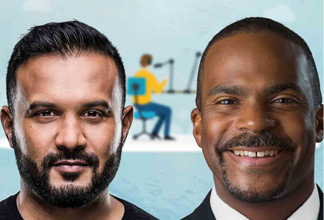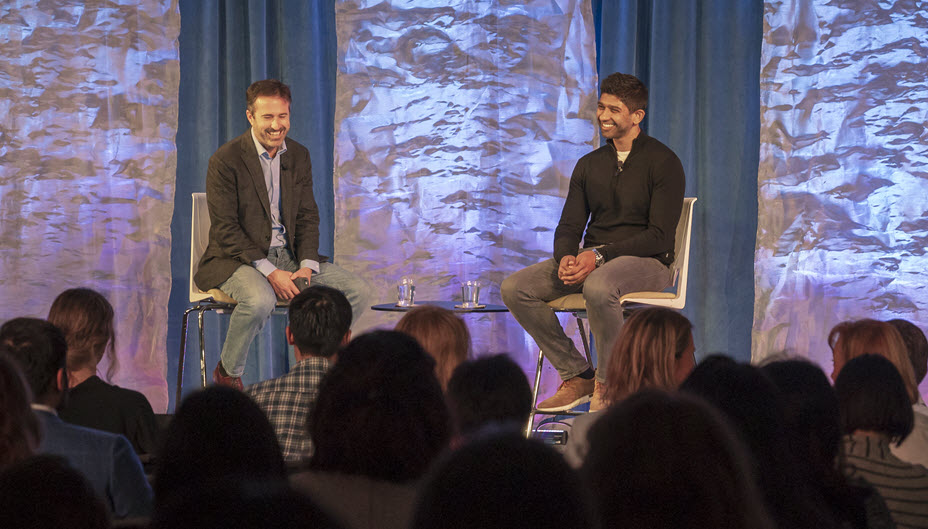Lunch Lines Beware: Ritual is Coming for You
Written by The Content Team
Published on May 23, 2019
minute read
Share:
Is lining up for take-out a thing of the past? Ritual, a clever app that lets hungry customers pre-order meals from their favourite restaurants, has become wildly popular since its launch in 2015. John Stackhouse, Senior Vice-President, Office of the CEO at RBC, recently sat down with founder Ray Reddy at RBC Disruptors, a monthly conversation about technology and innovation. Here's what they talked about.
___________________________________________________________________________
Conquering the Last Frontier of Digitization, One Lunch at a Time
By John Stackhouse
When Ray Reddy was a product manager at Google, he learned a trick from Larry Page: the toothbrush test. If you can use a product twice a day, it will become habit-changing. A ritual.
Reddy took this premise and applied it to the last frontier of digitization: the local market. His mobile pickup app, Ritual, delivers the one thing a global giant like Amazon can't: a hot coffee on your way to work, and a burger that's ready when you arrive at the food court.
"Line-ups annoy me," Reddy told the crowd at RBC Disruptors, our monthly conversation about technology and innovation.
As Ritual's CEO, he's working to make lines a thing of the past, allowing customers to place orders ahead of time. It's shaving time off daily routines, and creating a new way for eateries to attract new clientele.
In just five years, Ritual has grown from a test bed in Toronto to a global company operating in Canada, the U.S., the U.K and Australia. Reddy is looking to triple their restaurant count by the end of 2019.
At its core, Ritual is about connecting the physical and digital worlds by monetizing the local, in-person experience. It's an area ripe for disruption.
Local businesses have fallen significantly behind larger companies that have the time, money and talent to make big investments in the digital future. A BDC (Business Development Bank of Canada) survey of small and medium businesses found that only 19% have strongly adopted digital technology and culture. More than half of SMEs (small and medium-sized enterprises) were described as having "weak digital maturity."
As he studied the problem, Reddy concluded that the reason previous attempts to digitize the local market had failed was because of a lack of density. People don't care if you cover 500 restaurants — they care if you cover the 15 restaurants closest to them.
"We benefited from the 15 or 20 companies that tried before us," Reddy said. "We've been able to analyze why they failed."
Ritual took a block-by-block approach, making a product that was compelling for just one neighbourhood before moving on to the next one. For businesses, Ritual offers exposure to new customers — and access to data about their clientele that they'd been missing out on in the analogue world.
"Once you give people data, it's hard to imagine how you ran a business without it," Reddy said.
Now as the company scales, it's confronted with the challenge of making the digital work with the physical.
Small businesses are entering a digital market where expectations are high. "Customers have been spoiled," according to a recent McKinsey report. They expect a seamless user experience – no surprises, no delays. Companies have to go beyond automating an existing process, reinventing the entire business process to offer greater value and cut the number of steps required.
If a Ritual customer arrives at a food court and can't find their order, or a bottleneck means it isn't ready in time, that's a problem — and it does happen. Restaurants and food courts weren't designed for the digital user. So Reddy is helping to reshape their layout for a new era.
This means putting the pickup window front and centre, adding vertical shelving to accommodate all the orders that are ready for pickup, and making staffing changes to shift cashiers into “concierge" roles focused on connecting customers with the food they've pre-ordered.
As digital food ordering expands, it has interesting implications for the physical world. If 60-70% of customers are discovering a restaurant through an app, it doesn't need to be located on a busy street. It can move to where the rent is cheaper. This is giving rise to "dark kitchens" operating outside city cores, purely focused on food delivery.
The digitization of our towns and cities is just getting started, and the stakes to get it right are high. Digitally advanced companies are 62% more likely to have enjoyed high sales growth, according to the BDC report on small and medium businesses.
In 2019, when your local mom-and-pop shop is competing with Silicon Valley, that's a game changer.
RBC Direct Investing Inc. and Royal Bank of Canada are separate corporate entities which are affiliated. RBC Direct Investing Inc. is a wholly owned subsidiary of Royal Bank of Canada and is a Member of the Canadian Investment Regulatory Organization and the Canadian Investor Protection Fund. Royal Bank of Canada and certain of its issuers are related to RBC Direct Investing Inc. RBC Direct Investing Inc. does not provide investment advice or recommendations regarding the purchase or sale of any securities. Investors are responsible for their own investment decisions. RBC Direct Investing is a business name used by RBC Direct Investing Inc. ® / ™ Trademark(s) of Royal Bank of Canada. RBC and Royal Bank are registered trademarks of Royal Bank of Canada. Used under licence.
© Royal Bank of Canada 2025.
Any information, opinions or views provided in this document, including hyperlinks to the RBC Direct Investing Inc. website or the websites of its affiliates or third parties, are for your general information only, and are not intended to provide legal, investment, financial, accounting, tax or other professional advice. While information presented is believed to be factual and current, its accuracy is not guaranteed and it should not be regarded as a complete analysis of the subjects discussed. All expressions of opinion reflect the judgment of the author(s) as of the date of publication and are subject to change. No endorsement of any third parties or their advice, opinions, information, products or services is expressly given or implied by RBC Direct Investing Inc. or its affiliates. You should consult with your advisor before taking any action based upon the information contained in this document.
Furthermore, the products, services and securities referred to in this publication are only available in Canada and other jurisdictions where they may be legally offered for sale. Information available on the RBC Direct Investing website is intended for access by residents of Canada only, and should not be accessed from any jurisdiction outside Canada.
Explore More

How Soil Carbon Can Become Canadian Farmers' Next Cash Crop
Sustainable practices may mean untapped profits for Canadian farmers, says RBC Economics and Thought Leadership.
minute read

Hitting Net-Zero Means Rethinking How Canada Grows (and Buys and Eats) Food
Top takeaways from a discussion about the climate challenges and solutions that can be found in farming.
minute read

Diversity in Tech: "I Think This Is the Time," Says Lightspeed CEO
Key takeaways from a conversation on Black representation in a recent episode of Disruptors, an RBC podcast.
minute read
Inspired Investor brings you personal stories, timely information and expert insights to empower your investment decisions. Visit About Us to find out more.







